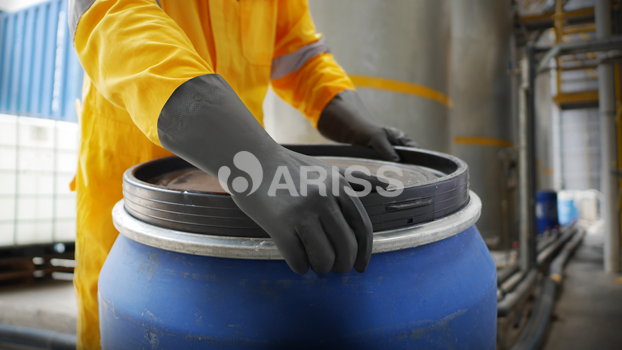We’re taking a detailed look at the household rubber gloves direct counterpart, which is, of course, the industrial gloves variety. These rubber gloves look incredibly similar to the household because they indeed are. However, plenty of differences make them ideal for industrial environments, far more than your typical household gloves.
What are Rubber Industrial Gloves?
The clue is most definitely in the name. These gloves are designed to be as durable and as long-lasting as possible, capable of handling the most volatile chemicals, the most aggressive substances. So they can keep going, even after hours, days, and even months of excessive use.
However, these are gloves designed to remain comfortable for the user to wear by reducing friction on the side and usually boast a one-size-fits-all approach, so you can pick up a pair of these gloves and get to work.
Now, while household gloves tend to be pretty similar, there are plenty of varieties of industrial rubber gloves available that enable you to specialize in whatever task you’re trying to carry out. Some of these alternatives include things like;
- Handling Protection Gloves – Gloves are designed to protect your hands while heavy lifting by offering a thick protective cover on your hands and enhanced grip features.
- Industrial Rubber Gloves BI-10 – If you’re working around waste disposal practices, these are incredibly durable gloves that prevent the risks of tears. These industrial gloves are essential if you need the precision and accuracy to carry out concise tasks requiring a certain degree of attention to detail.
- Industrial Rubber Gloves BI-12 – As the name suggests, these are gloves designed to help you become resistant to more extreme conditions when working in hotter environments. This could be anything from handling metal trays in a bakery to working at a steelworks.
Now, it’s worth noting that there are still further variations even within these variations of industrial gloves. Some industrial gloves are designed to be worn, for example, while working in volcano-like environments, perhaps taking samples or monitoring underground activity. However, these are not the same gloves you’ll wear when handling extreme hot trays.
As a business, you must understand the difference between the different industrial gloves available, so you’re choosing the right gloves for the job, just as discussed in the introduction. Of course, there are pricing, shipping, and availability factors to consider, but this is why you need to take time to research your options. This is what it means to be a responsible modern-day business.
Now, it should go without saying that the benefits and characteristics sections we’ve had in the other parts of our insights don’t apply here since it’s pretty self-explanatory. Each glove type has a specialist task, and you’ll invest accordingly as much as you need for each job.
On that note, we’re going to take some time to look into the process of buying PPE from a commercial standpoint and how you can set yourself up for the very best experience. Some of the businesses we supply to are:
- Trading companies
- Healthcare companies
- Hospitals and care companies
- PPE Trading companies
- Supermarket chains
- Food Production and Processing Companies
- Cleaning companies or product suppliers
- Some domestic service users
Here at Kim Gloves, we manufacture industrial gloves that are durable, strong, and long-lasting. We supply many industries with rubber gloves that suit their needs. Our industrial gloves are used in the fishing industry, automotive, food production, food processing, animal care, veterinary, and many others. Our gloves have been featured in the media, specifically in South Korea, where we are among the top market leaders of industrial gloves. Our rubber gloves factory in Thailand is ready to ship anywhere in the world, whether under our brand or OEM. Contact us to purchase industrial rubber gloves.

